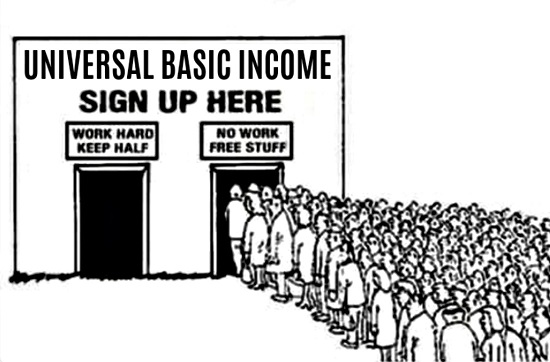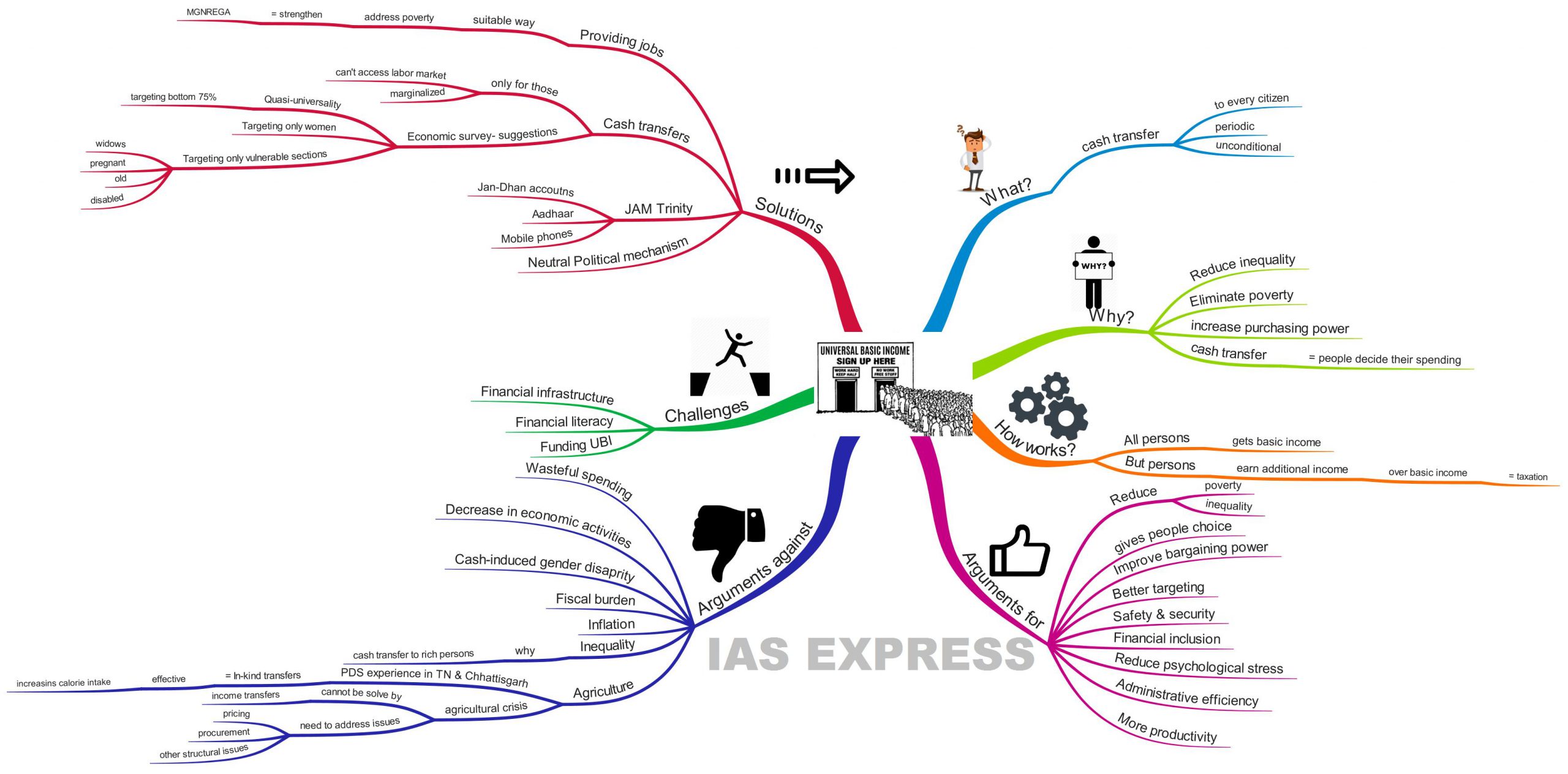Universal Basic Income – Is it a Remedy to the issue of Poverty & Inequality?

Updates *
Sikkim is set to become the first state in India to launch Universal Basic Income (UBI). The idea of universal basic income has gained popularity in western nations due to the threat of automation-induced job losses. In India, the idea gained ground due to chronic poverty & inequality and the government’s failure to provide subsidies effectively to poor people. Moreover, the persistent farm distress and poor wage growth across occupations also highlight the need for an income support scheme in India.
What is Universal Basic Income (UBI)?
- Universal Basic Income is a periodic, unconditional cash transfer to every citizen in the nation.
- Here, social or economic status of a person is not considered.
- There are 3 major features to the UBI
- Universalistic – UBI does not target any specific person or group.
- Cash transfer – instead of in-kind transfer.
- Unconditional – There is no need to prove unemployment status or socio-economic identity for getting benefits under UBI.
- Based on the poverty level, consumptions level, income, and inflation, the Economic Survey suggests a minimum UBI of Rs. 7620/year for 2016-17. This is supposed to be 4.9% of GDP.
What is the need for UBI?
- UBI is the form of social security which will help in minimising inequality and eliminating poverty. Hence it guarantees dignity and security for all citizens.
- Since human labour is being increasingly substituted by technology, the wage income is being reduced drastically = the purchasing power is reduced as a result. Thus UBI will compensate for the reduced wage income.
- In Indian welfare model, several authorities provide various subsidies (money, food, housing, travel, education, healthcare, etc) based on their own priorities and targets (Poor, Young, Old, Disabled, Mother, Child, etc.). Hence it is in this context, it is right time to ask the question “Why not have one universal basic subsidy” that covers everything and let people decide how they want to spend it, instead of trying to target subsidies based on our poor knowledge of what people need or deserve.
- It aims to achieve progressive universalism which is a determination to ensure that people who are a poor gain at least as much as those who are better off at every step of the way toward universal coverage, rather than having to wait and catch up as that goal is eventually approached.
How does the UBI Works?
- Under UBI, persons without any income will get the full benefits in net terms.
- People who earn additional income over the basic income will be subjected to taxation.
- Hence even though the UBI is universal, only the poor will get the complete benefits.
What are the arguments in favour of UBI?
- Poverty & Inequality reduction: UBI will result in equitable distribution of wealth.
- Choice: Citizens will have the choice to spend on whatever they see best for their welfare. Because UBI follows “One Size Does Not Fit All” approach.
- Bargaining power: Increased income will increase the bargaining power of individuals since they are no longer be forced to accept any working conditions.
- Targeting: Since all citizens are targeted, there will be no exclusion.
- Safety: UBI acts as a safety net against health, income and other shocks.
- Financial inclusion: transferring basic income directly into bank accounts will increase the demand for financial services = help banks invest in the expansion of their service network, which is very crucial for financial inclusion.
- Reduce psychological stress: A guaranteed income will decrease the pressure of finding a basic living on a daily basis.
- Administrative efficiency: UBI, instead of a truckload of separate government schemes will minimise the administrative burden on the state.
- More productivity: Under certain circumstances, UBI could promote greater productivity. For instance, agricultural labourers who own small piece of land or used to work in others’ farm for meager wages, can now undertake to farm on their own land. In the long term, this will reduce the number of unused lands and helps in improving agricultural productivity.
What are the arguments against UBI?
- Wasteful spending: Households may spend this additional income on unnecessary activities or on temptation goods such as alcohol, tobacco, etc.
- The decrease in economic activities: A minimum guaranteed income might make people lazy and opt out of labour market = Decrease in economic activities and in result decrease in economic growth rate.
- Cash-induced gender disparity: In our patriarchal society, men are likely to exercise control over the spending of the UBI which may not always be the case with respect to other in-kind transfers.
- Fiscal burden: Due to the large size of the population, the government may experience high fiscal burden. Furthermore, once introduced, it may become difficult for the government to wind up a UBI in case of failure.
- Inflation: The fiscal burden caused by UBI may prompt the government to increase taxes = result in inflation = reduce the purchasing power of the people.
- Inequality: Critics argue that the transfer of income to rich persons would compromise the idea of an equal society and state welfare for the poor.
- State’s responsibility: Cash transfer = the govt would be withdrawn from the responsibility of providing basic services like health, education, nutrition, and livelihood = privatization of basic services = large scale exclusion of poor and marginalized.
- Agriculture: The experience of PDS in Tamil Nadu and Chhattisgarh shows that in-kind transfers are twice as effective in increasing calorie intake compared to equivalent cash transfer. Similarly, the agricultural crisis is unlikely to be resolved by income transfers, where addressing pricing, procurement, and other structural issues are essential.*
What are the challenges in the implementation of UBI?
- Financial infrastructure & exclusion: According to the World Bank, there are only 20 ATMs for every 1 lakh population. Around 1/3rd of the Indian adults remain unbanked. With such a state of financial service infrastructure and financial inclusion, it would be difficult for people to access their benefits.
- Funding UBI: Financing the guaranteed minimum income would be another challenge. There are chances that the UBI would become an add-on to existing subsidies instead of replacing them.
What are the solutions?
- Providing Jobs: A suitable way to address poverty is to enable citizens to earn their living by providing jobs. For those who are willing to work, schemes like the Mahatma Gandhi National Rural Employment Guarantee Scheme should be strengthened.*
- Cash transfers should be provided only for those who are unable to access the labor market or are marginalized due to other reasons. The Economic Survey proposes 3 alternatives.*
- Quasi-universality – Which means targeting the bottom 75% of the population. The cost of this quasi-universality accounts for 4.9% of GDP.
- Targeting only women – As women face worse prospects with respect to employment opportunities, education, health or financial inclusion, a UBI for them can reduce the fiscal cost to about half. Moreover, giving money to women also decreases the issue of money being utilized on ‘temptation goods’.
- Certain vulnerable sections – UBI that targets only certain vulnerable groups like widows, pregnant mothers, the old and the disabled.
- However, if this alternative/s adopted, then it will also face the problem of ‘exclusion error’ in the beneficiaries identification = efficiency reduced = UBI will not stay universal.
- JAM (Jan Dhan-Aadhaar-Mobile) Trinity can be utilized to provide funds effectively to each individual directly into his or her account. Because
- Because PM Jan Dhan Yojana has ensured universal access to the bank account and India now has 180 billion accounts and over a billion Aadhaar cards have been distributed.
- However, authentical failures in Aadhaar are as high as 49% + around 60% of Jan Dhan accounts remain inactive as of now + issues in mobile network connectivity especially in rural areas = Exclusion of beneficiaries.
- Hence the success of UBI depends largely on the success of an efficient mode of delivery such as JAM Trinity. A behavioural change is necessary on the part of account holders so that they use their accounts frequently.
- Economic Survey points out that UBI should be indexed to inflation for revision.
- Furthermore, there is a need for a neutral political mechanism to consider UBI implementation.
Conclusion
UBI is a powerful idea which will act as a panacea for the problems of inequality/poverty in India. However, there is a need for more research and discussions with all the stakeholders so as to come up with effective solutions that address all the challenges and concerns regarding the UBI.
If you like this post, please share your feedback in the comments section below so that we will upload more posts like this.


